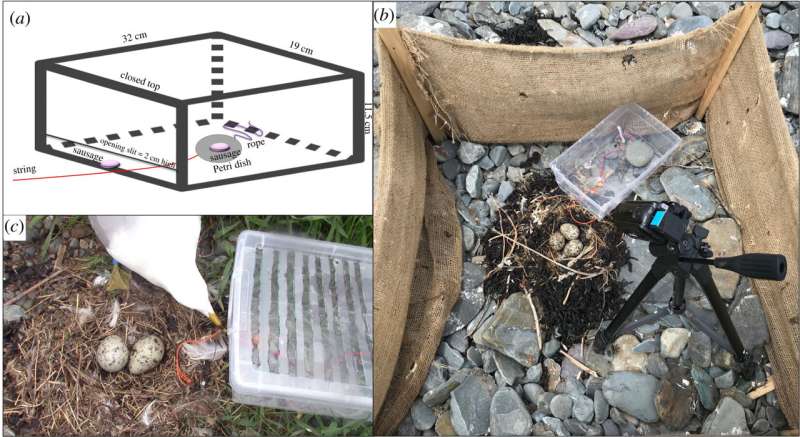December 6, 2021 report
Ring-billed gulls found able to pass the string-pull test

A team of researchers at the Memorial University of Newfoundland has found that the ring-billed gull is able to pass a widely used cognitive test called the string-pull test. They describe their results in a paper published in the journal Royal Society Open Science.
The string-pull test is a widely used experiment to test the cognitive abilities of animals. The researchers note that multiple studies of perching birds and parrots have been conducted to learn more about their intelligence, but very few have been done for waterbirds. They suggest this is because such birds are considered to be less intelligent than other birds. To verify, the researchers set up an experiment using the string-pull test for ring-billed gulls. It is a test that involves placing a treat on a dish and tying it to a string and placing both inside of a plastic box with a slit on one end. The slit is just large enough for the dish and treat to pass through. One end of the string is placed outside of the box. For a bird to gain access to the treat, it must yank the string, pulling the dish and treat through the slit. Scientists suggest it takes problem-solving abilities to pass the test, a sign of intelligence.
The experiment started with the researchers placing empty boxes near nests in Newfoundland with a treat placed near them, allowing the birds to become accustomed to eating food near the boxes. Then, they began testing the birds by placing test boxes near 93 nests that were home to 138 parent gulls. They then counted how many birds tried to retrieve the treat from the box and how many succeeded and how many tries it took.
The researchers found that out of approximately 104 attempts, 25 percent were successful and 21 percent of the birds succeeded on their first try. They also found multiple instances of birds that were able to repeat their success. They conclude by noting that their experiments mark the first time a waterbird has been found to be able to solve the string-pull test.
More information: Jessika Lamarre et al, Waterbird solves the string-pull test, Royal Society Open Science (2021). DOI: 10.1098/rsos.211343
Journal information: Royal Society Open Science
© 2021 Science X Network


















